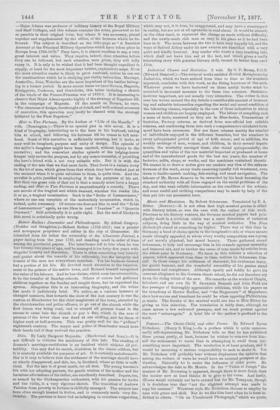Heir to Two Fortunes. By the Author of "Life of
the Moselle!' 3 vols. (Remington.)—There is no special plot in this novel. It is a kind of biography, introducing us to the hero in his boyhood, taking him to school, and following his fortunes till he comes to full man- hood. Some of this narrative is snttciently amusing, but it lacks, as may well be imagined, purpose and unity of design. The episode of the miller's daughter might have been omitted, without injury to the narrative ; and the somewhat similar episode of the lodging-house keeper only serves the purpose, not by any means essential, of providing the hero's friend with a not very suitable wife. But it is with the needing of the tale that we find most fault. That there is a certain irony in the lot of men, which gives them that which they have desired just at the moment when it is quite valueless to them, is quite true. And the novelist le quite justified in employing it for the purposes of his art. Bat then one great rule of that art is that a comedy must have a happy ending, and Heir to Two Fortunes is unquestionably a comedy. There are novels of the tragical sort which demand, whether the reader like it or no, a tragical termination. Such is the "Bride of Lammermoor," where no one can complain of the melancholy termination, which is, tatted, quite necessary. Of course one does not like to read the "Bride of Lammermoor" again, as one likes to read "Ivanhoe" or "Quentin Durward." Still artistically it is quite right. But the end of Gladys in this novel is artistically quite wrong.






































 Previous page
Previous page